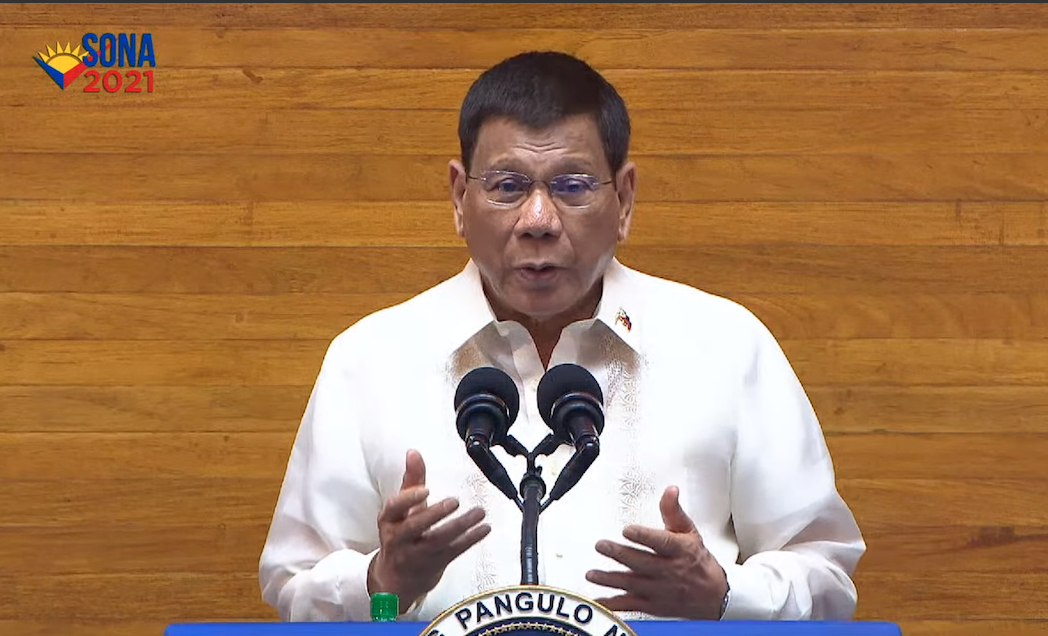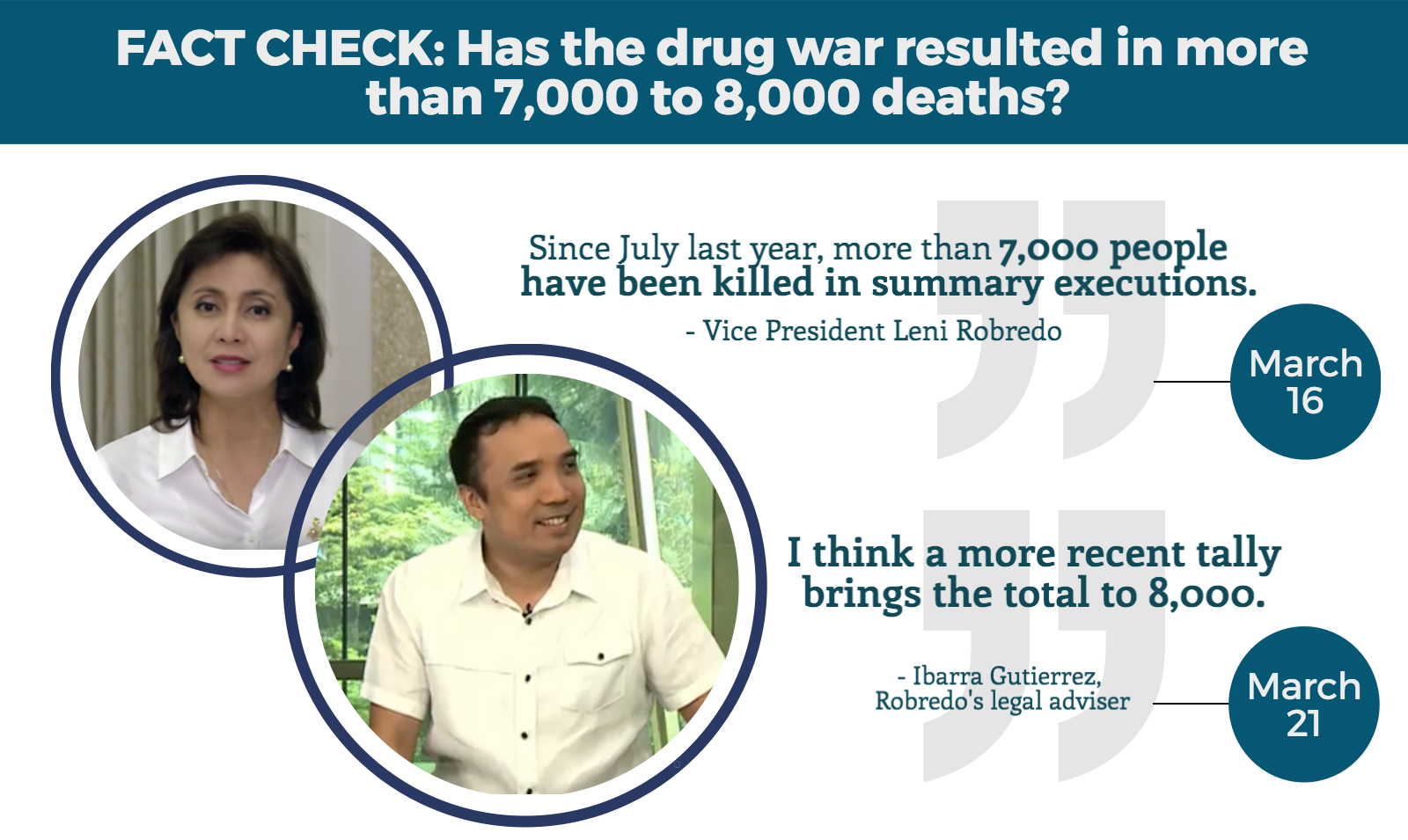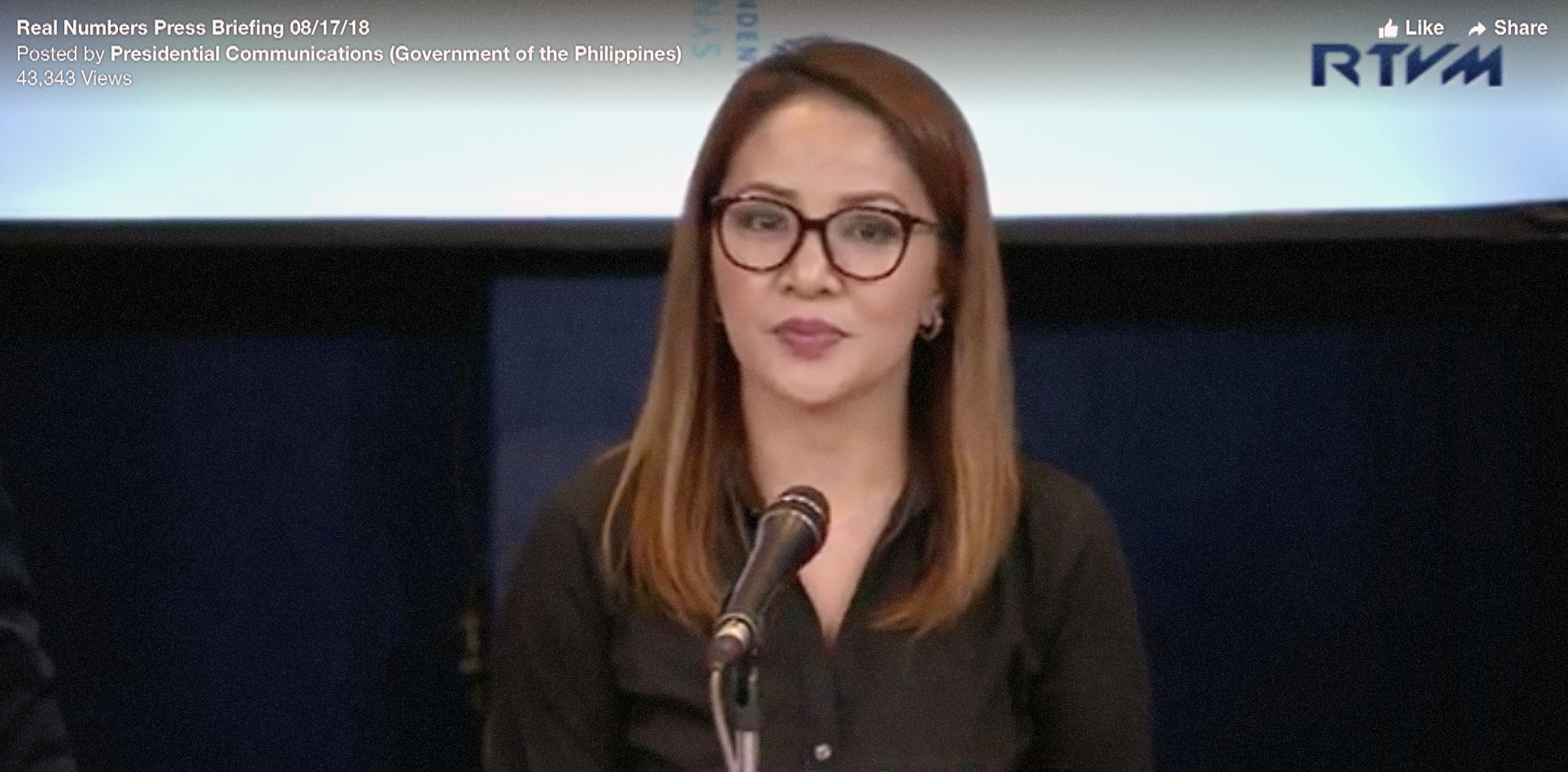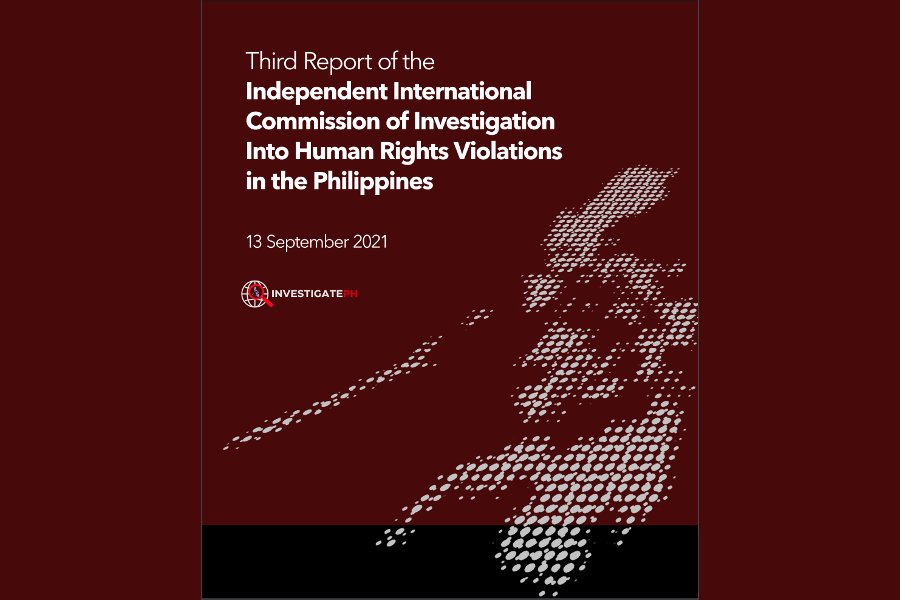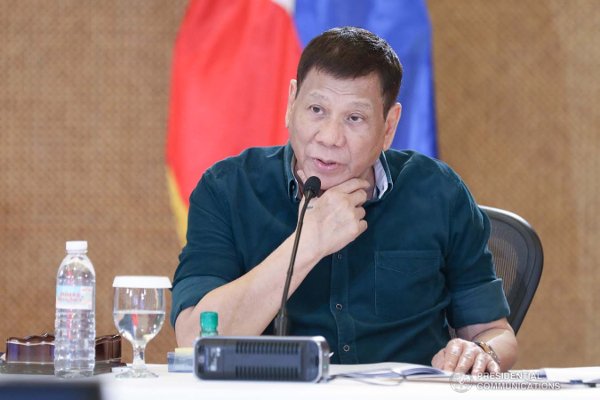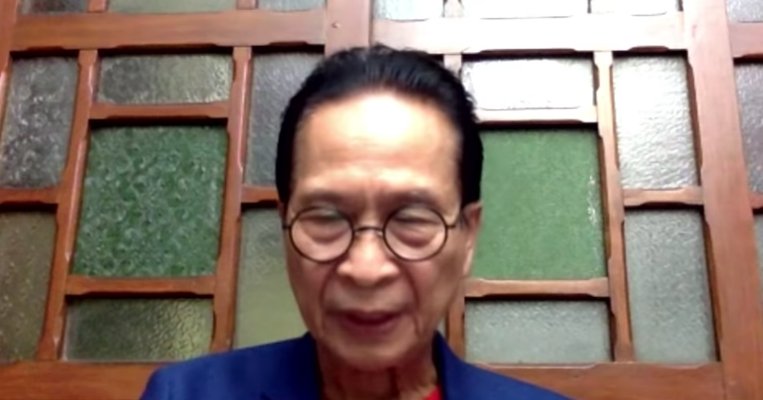President Rodrigo Duterte spent over 60 minutes discussing his administration’s bloody war against illegal drugs in his last State of the Nation Address (SONA) that lasted almost three hours on Monday, repeating his now-familiar rants about how drug addiction has destroyed families and increased criminality in the country.
Duterte said the controversial campaign had led to the surrender and “neutralization” of millions of drug dependents but admitted that the problem persists, revealing that nine police generals and Bureau of Customs personnel were involved in drug trafficking. He said P1 billion worth of contraband are seized and about 1,000 individuals arrested every day in drug-related cases.
“I did not know I was fighting my own government. Customs and everyone else was facilitating the import[ation] of drugs … That’s why I go crazy looking at the situation,” he said.
The President looked back on the last five years as he explained early on in his long and winding speech that his last SONA would be less about visions but more on remembrances.
Duterte said he made it a priority to strengthen and boost the morale of the armed forces and the national police which were “overwhelmed” by criminality, the drug problem, the Communist insurgency, and the separatist movement in Mindanao. He credited the police and the military for destroying 15 communist fronts as he accused the rebels of enlisting children and members of indigenous tribes whose lives have been destroyed.
“My orders to you, if you see them walking around, kindly shoot them dead. I will be happy. Anyway, you will only be charged in the ICC (International Criminal Court) together with me,” the president said, referring to the agency’s investigation into alleged human rights violations under his administration.
Stressing that peace and security are not purely a military concern, Duterte highlighted the work of the controversial National Task Force to End Local Communist Armed Conflict (NTF-ELCAC) which has been accused of red-tagging government critics. He credited the group for “building safe and conflict-resilient communities” that has resulted in the surrender of 17,000 communist rebels.
“With the creation of the NTF-ELCAC, we have made strides in addressing the root causes of this conflict by empowering our kababayans who have been used by the communists,” Duterte said. “I am confident that support for the communist movement will continue to erode in the next few months.”
As in his previous SONAs, the chief executive once again said that the government will continue to pursue an independent foreign policy. While he stressed that the arbitral ruling on the West Philippine Sea territorial dispute is now part of international law like he told the United Nations General Assembly last year, Duterte chided his critics for demanding that he take stronger steps against Beijing and assert the country’s claims in the contested area.
“What will I do with a document that does not bind China because they were never part of that arbitration?” he said. “Even on the coast of the beach of Palawan, before you can take off, the missiles of China will be there in five to ten minutes.”
Duterte showed the same helplessness in dealing with the COVID-19 pandemic, especially with the more infectious Delta variant now in the country. In contrast to the confidence he displayed in his 2020 SONA where he declared that the coronavirus disease 2019 (COVID-19) would soon “be laid to rest,” the president warned of possible stricter quarantine requirements.
“I really don’t know what to do,” he said, explaining that he was relying on the advice of the inter-agency task force on coronavirus. “I hope it will not go any farther but if something wrong happens, I will have to be strict … there will be just like what happened in [the] early days … If it requires a new vaccine, we don’t have it yet. Maybe we just have to pray for salvation.”
The president noted that the government had ramped up the country’s testing capacity, pointing out that there were now 260 accredited laboratories nationwide that can conduct at least 50,000 COVID-19 cases daily. However, he lamented that the country was about to become one of the world’s fastest-growing economies until the health crisis “stalled everything.”
Duterte urged Congress to pass the proposed Foreign Service Act, Public Service Act, and Retail Trade Liberalization Act. He also pushed for the creation of a Center for Disease Prevention and Control as well as the Virology and Vaccine Institute of the Philippines.
The chief executive hit the two water concessionaires in Metro Manila, calling them part of a regional cartel, whose contracts are disadvantageous to the public. Last year, Duterte had threatened to cancel the government contracts of Manila Water Co., Inc. and Maynilad Water Services Inc. and hand over their operations to the military.
“Now, there’s a new contract. I have not thoroughly digested it. ‘Pag nandiyan na (When it’s there), then I will sign it, but, but the crime is there already and any Filipino would want to go after you. I will not free you. I will never allow that,” he warned.
Duterte once again used his SONA to attack ABS-CBN Broadcasting Corp. whose application for a new franchise was rejected by the House of Representatives last year. He accused the Lopez-owned network of airing “garbage” and cheating the government of billions of pesos in taxes.
“Even their equipment were imported, tax free. They still owe government in the billions,” he said.
On the rehabilitation of Marawi, Duterte said there was a need to “race against time” in rebuilding the city and bringing the residents back to their homes. The five-month battle of government forces with Muslim militants that had overtaken Marawi in 2017 destroyed the city, killed hundreds, and forced residents to flee their homes.
More highlights:
On the COVID-19 response:
Duterte thanked health frontliners who “selflessly gave their all in the fight against COVID-19” and lauded local governments for undertaking “new and heightened responsibility” amid the health crisis. Some healthcare worker groups, however, have asked the government to conduct mass hiring of healthcare workers and to release their benefits including the Special Risk Allowance and COVID-19 hazard pay.
Duterte underscored the efforts to increase testing, improve hospital care capacity, and the establishment of more temporary treatment and monitoring facilities nationwide. The Department of Health said there are a total of 273 licensed laboratories as of July 24. Recently, the government inaugurated the One Hospital Command Center (OHCC) as the National Patient Navigation and Referral Center, following the bill filed in June seeking to strengthen and institutionalize OHCC.
The president also stressed the importance of vaccination against the deadly virus, urging Filipinos to complete their two doses. Overall, only about 6,089,314 individuals completed their two doses, out of the government’s 70 million target for herd immunity by December 2021.
With the confirmed local transmission of the Delta variant, which is a “far more dangerous” variant than previous ones, Duterte said the country may go back to “strict” lockdowns “just as the early days of COVID.”
On social services:
Duterte, in his final SONA, highlighted government programs and laws passed under his administration that addressed the social welfare of Filipinos amid the pandemic.
He thanked Congress for the passage of the Bayanihan 1 and 2, which included social amelioration programs. Over P99 billion was already disbursed to 17.6 million families in the first tranche of cash subsidies under Bayanihan 1, while distribution of the second tranche is still ongoing despite the law’s expiration last year.
Duterte also cited the Department of Education (DepEd)’s efforts to “deliver quality and accessible education to all” despite the absence of face-to-face classes, through the distribution of ICT equipment for distance learning, among others. However, there have been complaints from both teacher and students regarding the difficulties brought by distance learning, such as the cost of gadgets and internet connectivity, causing students to lag behind lessons.
Even though his second to the last year saw no passage of any of the seven remaining priority bills from his previous SONAs, Duterte still mentioned a number of successful laws since he assumed presidency in 2016. Some of these are the Universal Tertiary Education Act which was enacted in 2017, the Universal Healthcare Act from February 2019, and the Malasakit Centers Act from December 2019.
Meanwhile, he addressed Congress and followed up on the passage of a law that will establish the Department of Migrant Workers and Overseas Filipinos, as well as one that will modernize the Bureau of Fire Protection. Duterte certified these measures as urgent as early as his 2019 SONA.
On illegal drugs and crime:
At the center of Duterte’s sixth and final SONA was the country’s illegal drug problem. Amid the request of retired chief prosecutor Fatou Bensouda of the International Criminal Court (ICC) to open an investigation into alleged crime against humanity in Duterte’s war on drugs, the president reiterated his warning: “The ICC can record it. Those who destroy my country, I will kill you.”
He highlighted the administration’s “unprecedented war against illegal drugs,” which has left at least 6,147 dead in police operations as of May 31, but admitted that the country “still [has] a long way [to go].” Latest government data show at least 31.24% or 13,210 barangays have yet to be declared drug-free.
On the peace agenda:
Duterte spent a chunk of time detailing the “strides” his administration has made in fighting the communist insurgency, his final SONA reflecting the turnaround of his position about the Left since his first SONA in 2016.
The president highlighted the efforts of his NTF-ELCAC in furthering his peace agenda. This, however, glossed over the hostilities the task force brought in red-tagging celebrities and universities in the recent past, among others. This April, senators made calls to defund the body after the latter red-tagged community pantry efforts.
Duterte also made mention of the 2018 signing of the Bangsamoro Organic Law, which created the Bangsamoro Autonomous Region in Muslim Mindanao. BARMM is currently under a period of transition to having its own parliament.
On foreign policy:
Duterte went full circle when he said his government had “vigorously pursued an independent foreign policy,” a promise he made in his 2016 SONA.
During his address, the president touted, among others, his administration’s success in the return of the historic Balangiga Bells — taken by the Americans as a war trophy during the Philippine-American War — in December 2018, and in sending back some 69 containers of household waste, weighing thousands of tons, to Canada in May 2019.
Duterte recalled his speech before the United Nations General Assembly in September 2020, in which he asserted the country’s 2016 arbitral win against China on the South China Sea dispute. But minutes later, he said there was nothing he could do with the “document,” falsely claiming that it did not bind China because it was “never part of the arbitration.”
As party to the United Nations Convention on the Law of the Sea (UNCLOS), China is bound to the award issued by the arbitral tribunal even if it opted not to participate in the proceedings. (See VERA FILES FACT CHECK: PH didn’t ‘handpick’ entire arbitration panel in South China Sea Arbitration case)
On the Armed Forces:
Duterte welcomed the two missile-capable frigates procured from South Korean warship manufacturer Hyundai Heavy Industries, delivered in May 2020 and February 2021, as a key part of the military modernization program. The acquisition of the frigates was initiated in 2013, during the term of late president Benigno Aquino III. “The continuous upgrading of our defense capability shall ensure that we shall uphold our territorial integrity and sovereignty from external and security threats,” Duterte said in his last SONA.
For the third time, the president renewed his call to establish a unified pension system for military and uniformed personnel “to maintain government fiscal flexibility and provide adequate remuneration to our men and women in uniform.” Legislation for this is still pending in both houses of Congress.
He also implored lawmakers to pass a law providing free legal assistance to military and police facing “charges arising from incidents related to the performance of official duty.” A bill introduced by his former aide Sen. Christopher “Bong” Go remains untouched since it was filed in 2019, while six other proposals are pending at the House level. (SeeSONA 2020 Promise Tracker: Armed Forces)
On the media:
On his last SONA, Duterte highlighted the issuance of his executive order on #FreedomOfInformation in 2016, which was one of the three promises he made related to the media during his first SONA.
Duterte also brought back the conversation on ABS-CBN, which he accused of airing “garbage” and cheating the government of billions worth of taxes. “Even their equipment were imported, tax free. They still owe the government in the billions,” he said, a claim that has already been disproven by the Bureau of Internal Revenue (BIR) and Securities and Exchange Commission (SEC).
On the environment:
Within the first minute of his last SONA, the president took pride in the Free Irrigation Law passed under his term which now exempts farmers with less than eight hectares of land from paying irrigation service fees to the National Irrigation Administration. Sandwiched between his spiel on criminality and the war on drugs, Duterte boasted of programs that sought to restore the “former glory” of Manila Bay. Its rehabilitation, which started on Jan. 27, 2019, successfully reduced the fecal coliform levels of the water that flows out of Manila Bay. He also recalled criticizing Manila’s water concessionaires last year for their failure to treat wastewater released onto the bay.
Near the end of his final state report to Congress, Duterte once more urged lawmakers to prioritize the creation of a disaster resilience department which has been languishing in the Senate since 2019. This is his fifth and final time, as the president, pleading with Congress for a disaster resilience agency.
On infrastructure:
Duterte asked various government agencies, including the Department of Public Works and Highways (DPWH) and the National Economic and Development Authority (NEDA), to “ensure” that all of the big-ticket projects under his P9-trillion “Build, Build, Build” program (BB) are finished by the end of his term in June next year.
Data from the NEDA as of May 2021 show that only 11 projects (nine fully, two partially completed) have been finished out of 119 projects listed under the BBB program. At least 14 are set for completion by the end of this year, 17 by 2022 , and 50 more by 2023 and beyond. Some 27 other projects are still pending government approval.
According to Anna Lamentillo, head of the DPWH’s BBB Committee, the Duterte administration has built and repaired 29,264 kilometers of road and 5,950 bridges. The government has spent around P4.086 trillion on infrastructure projects from 2016 to 2020.
On corruption:
Duterte, who won the presidency on a promise to end corruption within three to six months in office, now says that “corruption is endemic and impossible to end,” unless the government is overthrown. During a Cabinet meeting last February, Duterte admitted that it is impossible to curb corruption, but he vowed to dedicate the remainder of his term to fighting corruption.
He boasted of having terminated from government service the 43 immigration officers implicated in a multi-billion peso bribery scam known as “pastillas” scheme. He claimed not accepting gifts even when he was mayor of Davao City. But based on bank records obtained by VERA Files from the Senate, seven deposits totaling P193,705,615.88 were credited to the joint account of the then Davao City mayor Rodrigo Roa Duterte and his daughter, incumbent Davao City Mayor Sara Duterte-Carpio, at the BPI-Julia Vargas branch in Ortigas Center, during his 69th birthday, on March 28, 2014.
He also repeated a claim of having a meager salary as president. When he assumed office in July 2016, Duterte’s basic monthly salary was P165,752 until December of the same year, according to a VERA Files fact check dated April 17, 2017.
Under Executive Order No. 201 issued in 2016 by then President Benigno Aquino III, Duterte’s monthly salary had an annual increase that would have ranged from P388,096 to P399,739 until the end of his term in 2022.
On the economy:
Amid the challenges due to the COVID-19 pandemic, Duterte assured the private sector of his administration’s help in regaining the country’s pre-pandemic “commercial vibranc(y).”
The Philippines, he said, was “poised to leapfrog into the company of the world’s fastest growing economies until the COVID-19 pandemic stalled everything.”
He cited tax reforms put in place early on in his administration that sustained the country’s economic growth from the first quarter of 2018 to the third quarter of 2019. But the pandemic “has paralyzed business activities and crippled even the strongest of the world’s economies.”
“Indeed, the past five years have truly been challenging and humbling. I stand here before you today bearing no conceit, but if there is one thing that I could be proud of is that not once did I waver in doing the unpopular even if it meant upholding the greatest good for the greatest number,” he said before enumerating his administration’s achievements.
Prior to the pandemic, Duterte further recalled, the Philippines “recorded our lowest debt to GDP ratio since 1986, the highest revenue effort since 1997.”
However, Bangko Sentral Governor Benjamin Diokno said in May that the country’s debt to gross domestic product (GDP) ratio has risen to 54.6% as of end-2020 which, he added, remains below the 60% international threshold. In March, the debt-to-GDP ratio was at 60.4%. Government debt has reached P11.07 trillion as of May and outstanding foreign borrowings as of end-March were at $97 billion.
— with contribution from Blanch Ancla, Enrico Berdos, Meeko Angela Camba, Anthony Cuaycong, Rhoanne De Guzman, Nica Hanopol, Chi Liquicia, Tatiana Maligro, Martin Angelo Ramos, Jean Loriele Raoet, Merinette Retona, Elijah Roderos, Celine Isabelle Samson, Ivel John M. Santos, Jay Sebastian, Klaire Ting, Ellen Tordesillas, Tita C. Valderama
